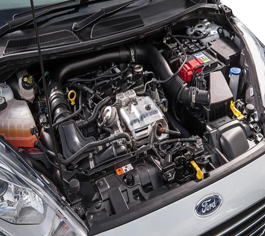Discover the Latest Ford Fiesta Engine Upgrades for Enhanced Power
Discover the Latest Ford Fiesta Engine Upgrades for Enhanced Power
Blog Article
The Future of Engines: Technologies Driving Sustainable Power Solutions
As the vehicle market browses the critical shift in the direction of sustainability, the future of engines is progressively defined by groundbreaking technologies. Electric engine innovations, alongside promising growths in hydrogen fuel cells and biofuels, are reshaping the landscape of power options. The emergence of crossbreed systems further complicates this evolution, presenting both challenges and chances to reduce exhausts effectively. Paired with the integration of man-made knowledge in engine design, these technological strides elevate critical concerns about their long-lasting practicality and effect on typical standards. What might this imply for the sector and customers alike?
Electric Engine Developments
The evolution of electrical engine growths represents a crucial change in the automotive and aerospace industries, driven by the urgent demand for sustainable choices to fossil fuels. This change is defined by significant advancements in battery modern technology, power electronic devices, and electric motor layout, which collectively boost the effectiveness and performance of electric engines.
Current developments have resulted in the development of lighter, extra energy-dense batteries, such as lithium-silicon and solid-state batteries, which assure longer ranges and much shorter charging times. In addition, improvements in electric motor performance, such as using permanent magnets and advanced cooling systems, enable electric engines to run successfully under differing problems. These enhancements not just enhance lorry efficiency however also contribute to a decrease in total energy consumption.
Furthermore, the integration of sophisticated software program formulas has maximized energy administration in electric vehicles, enabling regenerative stopping and predictive charging approaches. As producers progressively embrace electrical propulsion, the automobile and aerospace fields are seeing a paradigm change in the direction of greener innovations. This development not just satisfies governing needs yet additionally straightens with customer choices for ecologically pleasant transportation solutions, solidifying electric engines as a keystone of future lasting wheelchair.
Developments in Biofuels
As the automobile and aerospace industries significantly focus on lasting power sources, improvements in biofuels become a complementary service to electric engines. Biofuels, stemmed from organic materials such as plants, waste, and algae, offer a cutting-edge avenue for reducing greenhouse gas emissions and dependence on nonrenewable fuel sources.
Current study has focused on boosting the effectiveness and sustainability of biofuel manufacturing. Second-generation biofuels utilize non-food feedstocks, lessening competition with food supply and decreasing ecological impact. Additionally, developments in artificial biology have actually enabled the design of microorganisms to create biofuels better, causing higher yields and reduced production costs.
Furthermore, the growth of drop-in biofuels permits smooth assimilation right into existing infrastructure, making it possible for a smoother shift for sectors commonly reliant on nonrenewable fuel sources. ford fiesta engine. These fuels can be utilized in present engines without adjustments, facilitating their fostering across various markets
Investments in biofuel technology, in addition to supportive policies, are important to drive technology and scalability. As the international community seeks to deal with climate adjustment, biofuels offer a practical, prompt service that straightens with the overarching objective of sustainability in transportation and air travel.
Hydrogen Fuel Cell Technology
An expanding number of firms and researchers are checking out hydrogen fuel cell technology as a viable option to standard source of power in transport and power systems. This modern technology converts chemical energy from hydrogen right into electricity through an electrochemical response, with water visit this site right here as the only result, making it an eco-friendly alternative.
The core of hydrogen fuel cells is the fuel cell stack, where hydrogen molecules are split into electrons and protons. The flow of electrons creates electrical energy, while protons move with a you could look here membrane layer to integrate with oxygen from the air, developing water. This procedure causes high efficiency and low exhausts, placing hydrogen fuel cells as a crucial gamer in the change to sustainable power.
Considerable advancements have actually been made in boosting the sturdiness and efficiency of fuel cells, along with lowering costs through ingenious manufacturing methods. Additionally, the advancement of hydrogen manufacturing methods, such as electrolysis powered by renewable power sources, enhances the sustainability of the total system. As framework for hydrogen refueling expands and manufacturing methods end up being a lot more reliable, hydrogen fuel cell innovation holds great guarantee for decarbonizing different sectors, consisting of heavy-duty transport and fixed power generation.
Hybrid Solutions and Their Impact
Crossbreed systems represent a considerable evolution in lasting engine modern technology, merging traditional interior combustion engines with electrical propulsion to enhance energy effectiveness and reduce emissions (ford fiesta engine). This twin technique enables vehicles to utilize both source of power, allowing better versatility in power consumption and lowering dependence on nonrenewable fuel sources

In addition to environmental benefits, hybrid systems use customers a sensible change towards fully electric vehicles. They alleviate range anxiety by integrating the comfort of gas with the benefits of electrical propulsion, making them an attractive option for a broader audience.
The Role of AI in Engine Layout
Leveraging advanced algorithms and artificial intelligence techniques, the automobile industry is increasingly integrating expert system (AI) into engine layout procedures. AI boosts the performance and effectiveness of design by assessing large datasets to recognize optimum arrangements and efficiency criteria. This capability allows engineers to mimic different operating problems and predict engine actions under several situations, dramatically decreasing the time and cost connected with conventional web prototyping methods.
Additionally, AI helps with the growth of advanced materials and burning procedures customized for sustainability. By optimizing gas performance and lessening emissions, AI-driven designs align with international efforts targeted at lowering the carbon impact of vehicle engines. Machine learning formulas can additionally predict upkeep needs, leading to boosted integrity and longevity of engine parts.
Moreover, AI contributes in the integration of electrification modern technologies, such as hybrid systems, where it can maximize battery management and power recovery processes. As the sector relocates towards even more sustainable power remedies, the duty of AI in engine style ends up being significantly crucial, driving development and boosting the efficiency of future engines. Eventually, the partnership in between AI and engine layout proclaims a brand-new period of smarter, cleaner, and a lot more effective auto technologies.

Final Thought
Finally, the future of engines is being formed by a merging of cutting-edge innovations that focus on sustainability. Electric engine innovations, biofuel developments, hydrogen fuel cells, and hybrid systems collectively add to a substantial decrease in emissions and environmental influence. In addition, the integration of synthetic intelligence in engine layout improves effectiveness and efficiency. These transformative options highlight a dedication to developing a cleaner, much more sustainable automotive landscape, ultimately benefiting both society and the setting.
Electric engine developments, together with encouraging growths in hydrogen gas cells and biofuels, are improving the landscape of power services. Additionally, improvements in electrical motor effectiveness, such as the use of irreversible magnets and progressed cooling systems, enable electrical engines to operate efficiently under differing problems. By enhancing gas performance and decreasing discharges, AI-driven designs straighten with worldwide initiatives intended at minimizing the carbon footprint of auto engines. As the market moves in the direction of more lasting power remedies, the function of AI in engine design becomes increasingly essential, driving technology and boosting the performance of future engines. Electric engine developments, biofuel developments, hydrogen gas cells, and hybrid systems jointly contribute to a considerable reduction in discharges and ecological effect.
Report this page